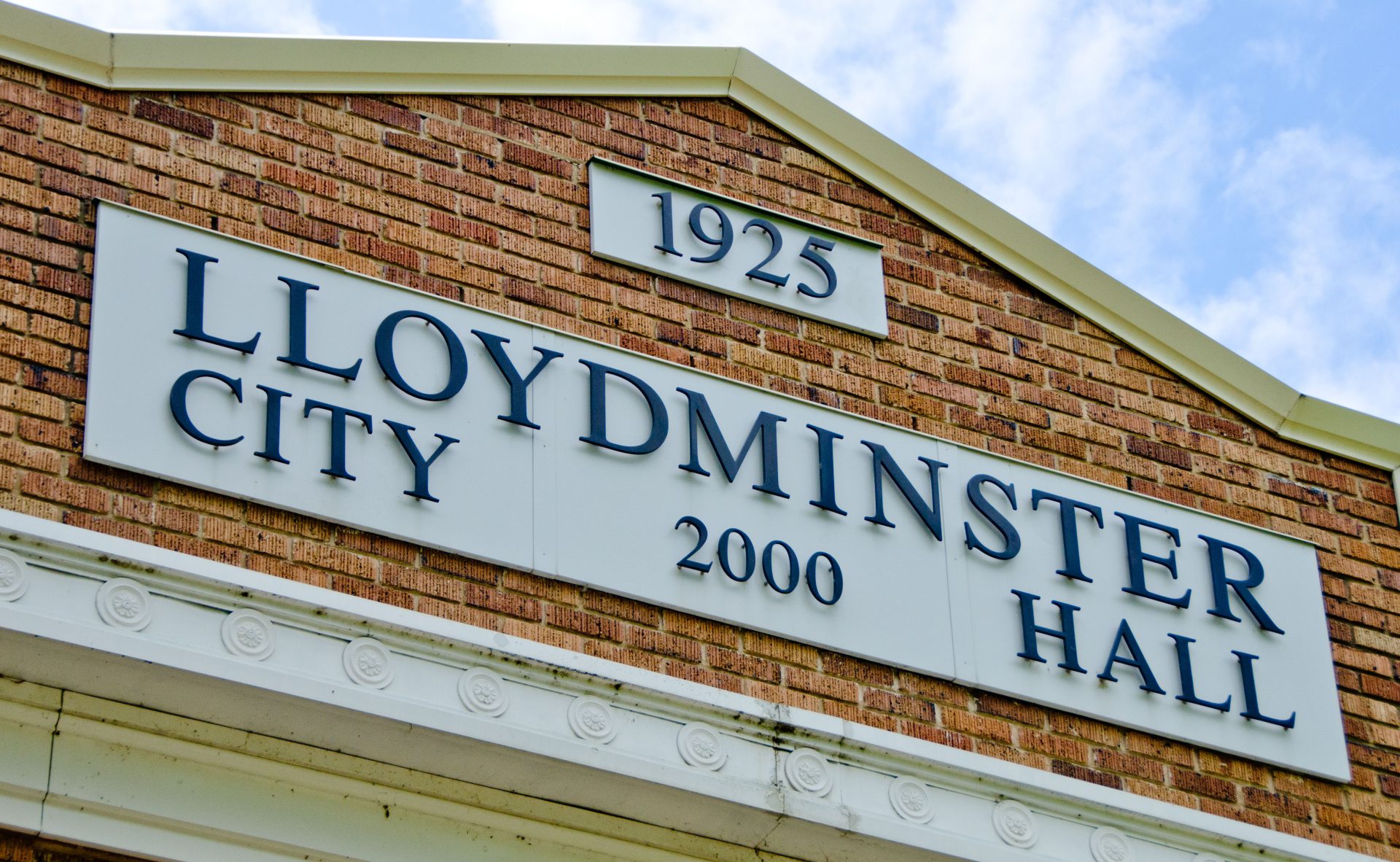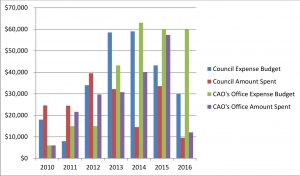Over the past six years, the budgeted amounts for travel and meals of City officials have been rising.
The rise can be seen by viewing the total budgeted amounts detailed in the accounts payable documents released by the municipal government in recent days, which have provided a detailed picture of the operational expenses undertaken by the City as an organization.
Based on the information contained in those documents, both the travel and meal budget for city council members and the travel and meal budget for the office of the city manager have seen significant increases since 2010, which was the last year the documents were attached to council agendas and readily available to the public.
The budgeted amounts and money spent in each year for both the City Manager’s office and City Council have been pictured below.
This graph was created by reading the budgeted totals for travel and meal accounts at the start and end of each year, which can be seen in the accounts payable documents released by the City of Lloydminster.
In 2014, the remaining balance in the council expense account became hard to ascertain, due to the account being replenished. The graph line for that year was drawn up by subtracting the last observable balance from the budgeted amount, before the replenishment began.
—————————————————————————————————————————————–
106.1 The Goat conducted an interview with Deputy CAO Kirk Morrison on September 27, in the interest of providing all relevant information on the topic of travel expenses undertaken by the City, and a transcript of the conversation is included with this article.
A recording of the interview is also available, via this link: https://soundcloud.com/vistaradioalbertaeast/james-wood-interview-with-deputy-cao-kirk-morrison
—————————————————————————————————————————————–
JW: To preface, I was going through the accounts payable, and when you look through the accounts payable, the budgeted amounts for certain accounts, which were often linked to travel expenses, various administration, some in senior administration, some junior managers, that kind of thing, they were all going up over the last six years. So, the first question I’ve got for you, what have been the budgeted amounts for senior administration expenses over the last six years, if you can answer that?
KM: I think, uh, firstly what I want to touch on is that we do not have expense accounts, specific to senior administration. What we do have, is budgeted amounts for travel and meals, and those expenses are handled at our department level, and so just wanted to clarify, that there is not a budgeted amount for Kirk Morrison’s travel. One of the things, that we’re trying to do, that we talked about, is from a reporting perspective, reporting that information. That is aligned with our commitment to be transparent, and accountable for those expenses. Coming to the second part of your question, you know, there’s a trend towards increasing costs, for those expenses, and I think over the last six years there has been a greater focus on engaging with our provincial and federal governments, primarily to access grant funding, and to tell our story about being a bi-provincial community. That brings a set of challenges, that unless you’re living it, you really don’t understand. There is an education component with our provincial and federal partners. They can understand, what we’re up against, as a bi-provincial community, so that is certainly, that greater focus, on telling that story, has resulted in greater travel expenses, and I would say that there also has been a greater focus on investing in our people, and investing in training, development, opportunities, so that we can continue to grow our team.
JW: Ok, but do you have those budgeted amounts in front of you?
KM: Yeah, I don’t have those budgeted amounts in front of me.
JW: Ok. With those amounts, those travel and meals accounts, across all departments, who sets those amounts? Who determines what amount to budget for each year?
KM: Yeah, so, essentially our management team, is responsible for creating all of our operating budgets, and ultimately the way it works is that those budgets are rolled up into department business plans, which are submitted and attached to our operating budget, and ultimately the director will take accountability for what has been budgeted for travel within their department.
JW: And that’s signed off by the director? Or it goes from the director to the City Manager? How does that (work)?
KM: Yeah, essentially it goes from the director, to the City Manager’s office, and then that budget package is put forward to council for final approval.
JW: And, so, the third question I have, why those amounts increased, you’ve kind of already detailed that. You’re saying that’s because it’s due to increased travel, to federal, provincial, representation, and employee education. Is that essentially it?
KM: I think the other key piece there is building relationships with our community partners. Some of those relationships are headquartered away from Lloydminster, and that requires travel.
JW: What happens when expense accounts of City officials go over budget? Because you can see, in multiple areas of the accounts payable, there will be an account listed for travel and meals, and it will say, depending on the year, and depending on the time of year, it’s listed over budget. So, what happens when that occurs?
KM: A couple of things. One, we need to ensure that we’re being accountable for those expenses, and have a conversation to determine why those expenses are going over budget, and many factors can lead into expenses going over budget. It’s not just travel and expenses. Anytime we go over budget, there is going to be a conversation. Oftentimes, we will re-allocate budget in between different business units in order to adjust to changing priorities.
JW: What determines how those expense accounts are budgeted in the first place? When the management team sits down, how do they determine how much to allocate to the account?
KM: I think a couple of things. One, is looking at our historical level of investment, our historical expenditures, helps to inform our decisions, and I think the other piece of that is anytime we’ve got major projects on the go, we will look to what type of conference opportunities there may be and plan ahead for those types of conference-type activities. Another key planning process is that at the start of the year, with our management team, we set out a performance plan that indicates what learning opportunities, what travel is going to be required. Those things all inform our budgeting and planning process.
JW: This is a question that may get answered afterwards, but you can speak to it a little bit now. The expense accounts for, well, the travel and meal accounts, they were replenished towards the end of 14 and 15, you can see it in the accounts. So, where, if you can give a little bit of detail, if Lisa needs to speak to this afterwards that’s ok, but can you give a bit of detail as to where the funds to replenish those accounts comes from?
KM: Yeah, sure, and we will find the specific amounts and get that information to you by the end of the day, but generally speaking, whenever we are managing budgets at a detailed level, if there is travel in one area, that is more intensive for whatever reason, there is an opportunity to re-allocate those expenses from one account to another. This is something, as a municipality, not only from a travel expense perspective, but certainly from an operations perspective, if we are experiencing unforeseen costs, we’ve got a responsibility to keep our overall expenses under budget. You may have a major snowstorm that requires you to expend more than you had planned for, but at the end of the day, we operate within an overall expense. For the past six years, those overall expenses have been under budget, and that is the result of making sure that we’re being responsive to where we’re at with expenses.
JW: Alright, so, moving on. Along with traveling expenses for administration members, seen in the accounts payable, you can also see total budgeted amounts for council expenses. The account names change over the six years. I think 2016, you’ve got council expenses, and then council travel expenses account, not sure of the exact names off the top of my head but you can see them in there. If you can speak to it, do you know what the total budgeted amounts for council expenses, travel and meals, per diems, that kind of thing, between 2010 and 2016? Do you have those amounts to hand, or no?
KM: I don’t have them at hand, but again that’s information that we can provide to you.
JW: Ok, then with council, who decides on those budgeted amounts? Is it the same process you were talking about before, does management sit down, and talk about council expenses? Or does council talk about that?
KM: Essentially, the budget for council expenses is really driven by the mayor, and through conversations with council. Administration acts to facilitate that process, with council.
JW: How many workers in the City carry credit cards to be used for City expenses, if you know that amount?
KM: Currently, we have 49 city employees that have credit cards, that are used for expenses.
JW: Do they have other parameters for how to use that card? Do you know those parameters at all?
KM: Yeah, absolutely, and so, essentially, whenever an employee expenses something on a credit card, those expenses are then tied back to the individual budgets that we’re allocated to. It’s a more efficient way to run business, in many situations, then alternative methods of procuring those services.
JW: Gotcha. Do administration and council write up reports on what they learned after they’ve travelled on City business? Like, if you go to a conference, or Glenn goes to a conference, you guys go for five days and come back, what happens then? Do you write up a report and submit it to council? How does it work?
KM: Those, uh, it has not been a practice to write up reports, and submit those to council, or provide that information to the public, but certainly, we have a great focus on ensuring value for taxpayers dollars, making sure that the knowledge that we gain on those conferences is transferred into our corporate knowledge. That primarily happens through conversation, and discussion of strategic initiatives, and that’s on the conference side, I think the other thing, we try to be very aware of on the education side, is how are we converting that education into contribution? It’s not just education for the sake of education, there needs to be contribution. These are things that we strive for.
JW: Ok, but just to be clear, it hasn’t been a practice in the past, there’s no reports from the past six years about conferences that have been gone to, that kind of thing?
KM: No, it has not been a practice to write a report.
JW: Ok. Going forward, will that (change)?
KM: Yeah, I think, you know, that’s something that we’re continuing to evolve our practices. From an accountability perspective, how can we ensure that this knowledge transfer is happening? ‘Kirk, you say that this stuff is important to you, but show me how are you really being accountable to make sure that this stuff happens’, so I think that as we continue to evolve as an organization, with our commitment to transparency and accountability, these are the kinds of things that we need to be discussing.
JW: Ok, so once reports are being made, you want to see those viewed by the public essentially?
KM: Anytime we create a document, it is a public document and certainly, there is a process for, for, for, uhm, releasing that information, and so I think that’s the question that you’re leaving me with, is how can you be accountable, what are you sharing with the public, those are good questions.
JW: Are there any specific examples that you can point to where the city has implemented knowledge learned from conferences and workshops? You were saying it primarily comes from conversation, that kind of thing, but is there anything that sticks out in your mind where the city changed what they were doing from something learned outside?
KM: Yeah, I think there’s a couple for me that I’ve been personally involved with. We are embarking on creating a new financial hub system, which includes financial software, as well as work management software, asset management software. All of these pieces of software need to integrate, and certainly that is a major project that we’ve got going on. One of our most significant capital investments is the operations centre, and certainly I was involved in that project, travelled quite extensively, to other communities who had made investments in that type of infrastructure, you want to want to ensure that you’re doing things right, when you’re making those major investments, so that’s something that I was personally involved with. Another one that is on the horizon is our wastewater treatment plant, and certainly our team has travelled extensively to look at different plants, their benefits, their drawbacks, that’s an $80 million dollars decision and you want to make sure and get that right, and how we procure that infrastructure, we’re continuing to learn and evolve. We’ve got upcoming plans this fall, to go to conferences that really talk about leading-edge procurement for those types of activities. Those are a few examples of the type of travel that we get into.
JW: Gotcha. Now, I think last question for you. Overall, do you think with the increases in travel costs, over the last six years with the budgeted amounts, ultimately, do you think that is providing value to the taxpayers of Lloydminster?
KM: Absolutely. Absolutely. I think that the City of Lloydminster is in this very unique position of being a bi-provincial community, and in terms of that travel with our provincial partners and our federal partners, to tell our story, to ensure that we’re not marginalized on the edge of each province, to have each province understand the contribution that Lloydminster makes to the greater economy, that is not going to happen by itself. We need to get out, and tell that story, and so what I would like to be able to point to is to how that’s been converted into grants. Unfortunately, I can’t demonstrate that value right now. I hope to, one day, be talking about how all of these activities have led to an announcement that the wastewater treatment plant is being funded at 50 per cent from the federal government, and the provincial partners are kicking in their share. I think at that point, you’re talking about millions of dollars, and I think that although we haven’t seen the results yet, we can continue to work towards that outcome.
JW: Alright. Is there anything else you want to say on the matter at all, or anything you think I’ve missed?
KM: Yeah, no, I think certainly we’ve got an opportunity to continue down the path of transparency and accountability, and taxpayers dollars and value are always top of mind.
—————————————————————————————————————————————–
The information in this report was drawn from the newly-released accounts payable documents. This story will be updated if more information becomes available.





